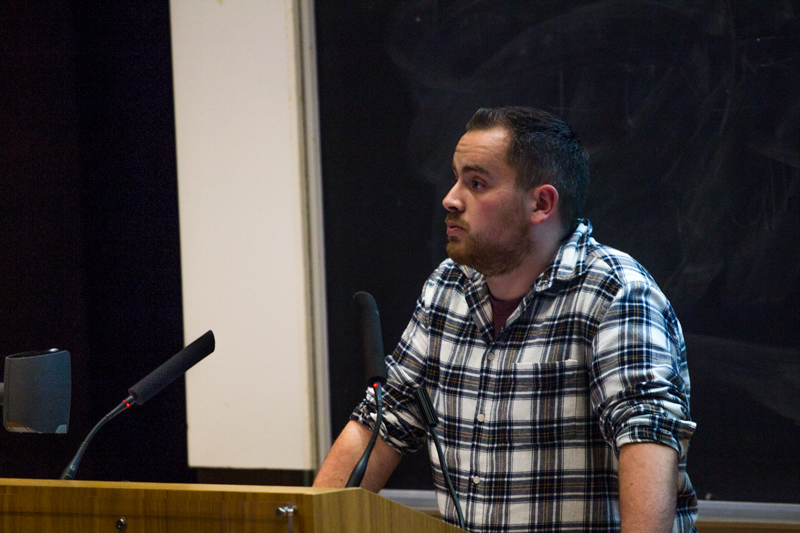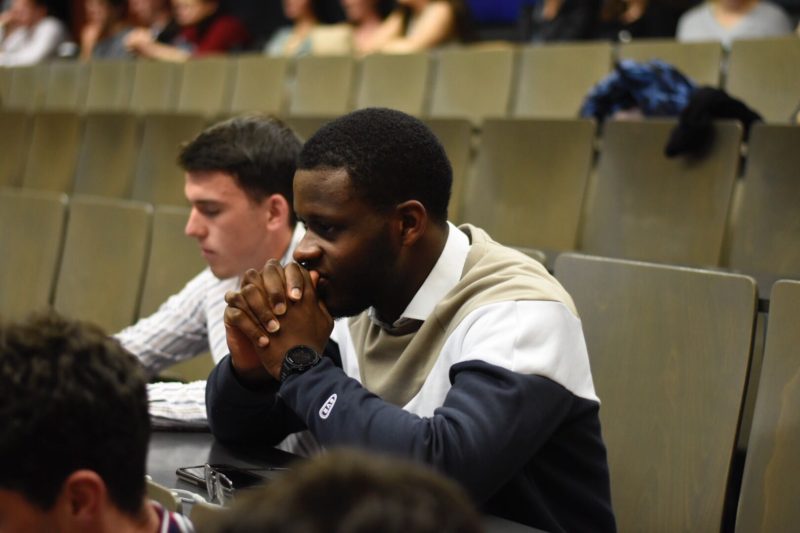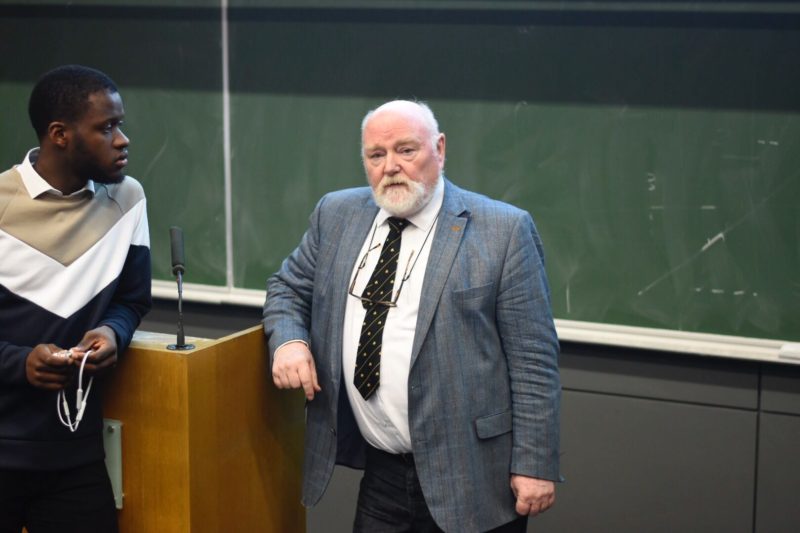After last night’s AGM, it’s fair to say that Dublin University Central Athletic Club (DUCAC) will enter its 100th year as an organisation unrecognisable from what it was at its foundation in 1919 – and quite possibly unrecognisable from what it was last year.
Last night, Jemil Saidi, a final-year engineering and management student, became the first student to be elected Chair of DUCAC, defeating incumbent Donagh McDonagh by 49 votes to 48. Saidi ran on a platform of making the organisation more student-centric and transparent.
Fraught with tension and packed with interruptions and raised voices, the meeting symbolised everything wrong with DUCAC – but also everything that it can be and what the future may hold.
As reporters from The University Times and Trinity News waited outside the MacNeill Theatre to cover the AGM, Donagh McDonagh, the now-former Chair of DUCAC, emerged from inside the lecture hall. He told the reporters that they couldn’t come inside – this was a private meeting, for members of sports clubs only.
Except it wasn’t. According to DUCAC’S constitution, some of which was written by McDonagh, all paying students are technically members of DUCAC: not allowed to vote, but allowed to attend its AGM. After all, student money is what funds the organisation.

Last night saw the future of DUCAC up for grabs as Jemil Saidi took on Donagh McDonagh to become Chair.
Diego Coyle Diez, the coach of Dublin University Archery Club and the catalyst for a lot of the recent changes in DUCAC, explained this to McDonagh in a tense confrontation outside the lecture hall. The Chair eventually yielded. The reporters filed in to witness what was a bizarre two hours.
As Chair, McDonagh has a sketchy past when it comes to upholding DUCAC’s constitution. DUCAC’s AGMs have been packed with breaches of the constitution. Membership of sports clubs weren’t checked in the last two years, meaning anyone present could vote. Last year, the AGM was not held in the first three weeks of term and no notice was posted in DUCAC’s noticeboard at Front Gate – another two constitutional breaches.
Last year, in what is now a seminal moment for the organisation, Coyle Diez stood up at the end of the AGM and called for a change to the voting structure of the organisation. Under DUCAC’s constitution, any member of a Trinity sports club can vote in DUCAC elections, meaning clubs can pack AGMs and get their candidate elected.
In his pitch, Coyle Diez suggested that instead of any sports member being able to vote, each club should have a single vote, guaranteeing each club equal say in DUCAC.
The motion was shut down by McDonagh, who claimed that such a motion would have to be passed by a campus-wide referendum. This, he said, was “democracy”.
Except nothing about a campus-wide referendum is mentioned in the DUCAC constitution – all constitutional changes require “a two-thirds majority of the Members present and voting” at a general meeting of the body.
But if McDonagh had bought some time for DUCAC’s status quo, his flouting of the constitution would come back to haunt him.
Saidi told The University Times last week that the way the motion was shut down actually contributed to a belief among many clubs that things had to change: “The response that was given, I think, got a lot more small clubs being like: ‘You know what, we’re going to back [Diego] here’, so … I think that did fan the flames a bit.”
The facts bear out Saidi’s claim: backed by three staff members in DUCAC and a handful of small clubs, Coyle Diez drafted a “one club, one vote” motion, hoping to get the signatures from 10 club captains that would trigger a general meeting and a vote on the constitution.

At last year’s AGM, Diego Coyle Diez called for a change to DUCAC’s voting structures.
The motion petered out eventually, and the meeting was never called. But the idea stuck around, and germinated. Last April, Saidi, as Vice-Chair, launched a petition of his own – essentially a tweaked version of Coyle Diez’s idea.
The idea was always going to feature last night. McDonagh himself brought it up in his speech for re-election. Looking around the theatre, he warned that such a motion would disenfranchise most people in the room. His speech, however, seemed to miss the point of the motion: most sports members aren’t informed voters who attend DUCAC AGMs and vote with their conscience. People who show up to DUCAC meetings usually know which way their vote will be cast long before they step into the lecture theatre.
But before he could make his speech, McDonagh faced questions from the audience. Aoife Simm, the captain of the archery club, asked McDonagh why he had ignored her club’s numerous requests to see minutes from the organisation’s previous meetings – minutes that are notoriously difficult to obtain.
McDonagh, usually so unshakable, looked caught off guard, and ran through a list of explanations for the oversight. He said that the first he had heard of a request to access minutes was when the DUAC emailed him the previous week. Bethany Rush, a member of Dublin University Fencing Club, quickly rebutted this, claiming that the request had been made at a DUCAC executive meeting that both her and McDonagh had attended last year.
After a tense exchange between members of the audience and McDonagh, the Chair unceremoniously ended the conversation.
“I hope I’m not going to be hung without hearing all the evidence first”, he said.
If it seemed like the hostilities were out of the way heading into the election for Chair of DUCAC, they weren’t. McDonagh, in a speech that exceeded the allotted time slot, accused Saidi of failing to adequately carry out his responsibilities as Vice-Chair in preparing for the 100th anniversary celebrations. “He hasn’t come up with a single plan”, McDonagh said, before emphasising the value of experience in order to preserve DUCAC’s autonomy.
Saidi had a different vision for DUCAC. “I’m running for chair”, he said, “in order to create a more transparent DUCAC – one that is answerable to the student”.

Saidi promised to make “a more transparent DUCAC”.
Saidi said he wanted to see “a DUCAC that not just listens to the student sporting community’s concerns and ideas but also takes action that benefits them. A DUCAC void of empty promises but a DUCAC that students can be proud of”.
In the end Saidi’s ideas won the day – by a single vote, showing a room deeply divided on what DUCAC’s future should look like.
But all in all it’s hard to overstate the significance of last night for DUCAC. It has elected a Chair that has openly called for radical change to its most fundamental structures, and it has voted out a stalwart of the old guard who had protected the organisation from College interference, but also from changes that many students have wanted for a long time.







